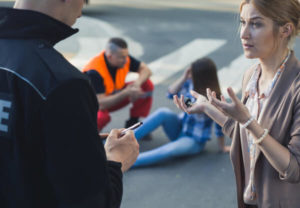I saw an accident happen in front of me, should I stop?
So, an accident happened in front of you. Now what? It’s normal to have your attention arrested by the human drama going on in front of you and any decent person wants to help where they can. But should you? And if you do, what are you then liable for if things go south? While it can get complicated, there’s a simple answer.

However, when it does get complicated, that’s when you need the services of Darrigo & Diaz. Our Tampa car crash attorneys have nearly 20 years of experience and will bring all of that to bear when you need their help. Give us a call at (813) 774-3341 to set up a cost-free case evaluation.
In the meantime, let us ease your mind about what you have to do if you see an automobile accident occur or if you happen to be involved.
Do I Have to Stop? Should I Stop?
Under Florida law, you are not required to do a single thing to aid the victims of an automobile accident you were not involved in. Leaving the scene of an accident you caused is, of course, illegal, but if you were just driving by when it happened, you can keep on driving.
That being said, Floridians stick together, and it’s a natural impulse to want to help when you see your fellow Sunshine Staters in trouble. The thing is, you don’t really have to do much most of the time. Almost all of us carry cell phones these days, and helping out could mean just calling 911 for emergency personnel and waiting around until they come.
If you happened to witness the accident, your statements could be invaluable to a police investigation and to anyone who happens to have been hurt. Your account of how the accident went down, who hit whom, or even just the general time and location of the crash could be of great benefit. All of this information can end up making a difference in the life of someone who has been hurt by a negligent driver and is in need of compensation.
You Have Legal Protections When You Provide Assistance
Like most states, Florida has “Good Samaritan” laws to protect people who try to render assistance at the scene of an accident. They’re mainly to cover health care officials and emergency workers, but their coverage extends to anyone who lends a hand.
The 911 Good Samaritan Act in Florida states that “[a]ny person, including those licensed to practice medicine, who gratuitously and in good faith renders emergency care or treatment… shall not be held liable for any civil damages as a result of such care or treatment.”
Simply put, this means if your attempts to help, when given in good faith and properly applied, cannot result in any legal action taken against you should they fail.
This liability exemption applies to medical professionals helping away from the scene of an accident, too. For example, a doctor working in an emergency room takes over care for an accident victim even though the said victim is not their patient.
The law is meant to cover health care workers and does not cover what may occur due to “reckless disregard” of the circumstances. That is, acting in such a way that the health care worker knows will be detrimental to the accident victim.
It goes for the rest of us, as well. For example, if you know CPR and have the proper accreditation, the Good Samaritan laws cover you if you apply CPR and it fails. Inferior knowledge or lack of accreditation, however, can open you up to legal action. It’s also important to get the consent of the victim before doing anything if they’re able to offer it.
There are a few exceptions to this apart from reckless disregard. They are:
- Failure to exercise due care increases harm to the accident victim. In other words, reckless behavior can cause more harm than good and should be avoided.
- The accident victim reasonably relied on the helper and suffered injury as a result. Going back to the CPR example, improper application can cause great damage. If you haven’t been properly trained in it, do not try it.
- Causing more harm than good, even if it’s unintentional, could result in liability. This may be due to reckless disregard by a medical professional where they should have known better.
Provide a Statement and Leave the Rest to Licensed Pros. Otherwise, Call Us.
Despite your good intentions, if you’re not properly trained to handle these types of emergencies, they can very quickly spiral out of control. You could cause more damage to the accident victim and, in many cases, put yourself in danger. Your best bet is to immediately call 911 and follow their instructions to the letter. You can also await instructions from first responders. Emergency responders are trained to not only help victims but also help Good Samaritans do what’s right and proper for all involved.
And again, should you find yourself in need of legal counsel, call Darrigo & Diaz first. We specialize in personal injury cases and will work to get you the settlement you need to get on with your life should you have been involved in an accident. The first consultation is free, so don’t hesitate. Call (813) 774-3341 or contact us online to set up an appointment today.

